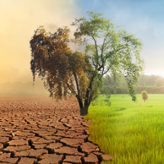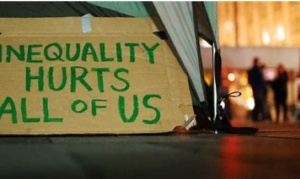
What is happening to our common home?
The Saint Anne Creation Care Committee continues highlighting Chapter 1 of “Laudato Si’: On Care for Our Common Home” with the hope that parishioners will be inspired to read (or reread) Pope Francis’ groundbreaking Encyclical.
This last week of June, we focus on three signs of social degradation—issues that are in urgent need of analysis:
4. Decline in the quality of human life and the breakdown of society (#43-47)
We must take into account the effects of environmental deterioration, current models of development and the throwaway culture on people’s lives (#43). Consideration of these effects indicates that the growth of the last two centuries has not always led to integral development and an improvement in quality of life (#46).
5. Global Inequality (#48-52)

The fifth area is that of global inequality Pope Francis clearly states that “the deterioration of the environment and of society affects the most vulnerable people on the planet,” the poorest and the excluded, who are the majority of the planet’s population, and who are often treated in international discussions as an afterthought or as collateral damage (#48-49).
The encyclical forcefully notes that “a true ecological approach always becomes a social approach; it must integrate questions of justice in debates on the environment, so as to hear both the cry of the earth and the cry of the poor” (#49).

The birth rate cannot be used as a scapegoat; we must face the question of “extreme and selective consumerism on the part of some” (#50). In the framework of an ethics of international relationships, the Encyclical indicates how a “true ‘ecological debt’” (#51) exists in the world, above all in the North with respect to the South. In the face of climate change there are “differentiated responsibilities” (#52), and that of the developed countries is greater.
6. Weak responses (#53-59)
Aware of the profound differences over these issues, Pope Francis shows himself to be deeply affected by the “weak responses” in the face of the drama besetting many peoples and populations. While we have treated our common home badly, especially in these last two hundred years, we have not found adequate responses to this crisis, an indication that international politics are subject to global technology and finance. “
Genuine attempts by groups within society to introduce change are sometimes viewed as “a nuisance, based on romantic illusions or an obstacle to be circumvented” (#54). We cannot be satisfied with “false or superficial ecology which bolsters complacency and a cheerful recklessness” (#59), but we must face up to our crisis and make bold decisions.
Even though positive examples are not lacking (#58), “a complacency and a cheerful recklessness” prevail (#59). An adequate culture is lacking (#53) as is a willingness to change lifestyle, production, and consumption (#59), but fortunately efforts are being made “to establish a legal framework which can set clear boundaries and ensure the protection of ecosystems” (#53).
Summary quote of this chapter’s message: “But a sober look at our world shows that the degree of human intervention, often in the service of business interests and consumerism, is actually making our earth less rich and beautiful, ever more limited, and greyer, even as technological advances and consumer goods continue to abound limitlessly. We seem to think that we can substitute an irreplaceable and irretrievable beauty with something which we have created ourselves” (#34).

